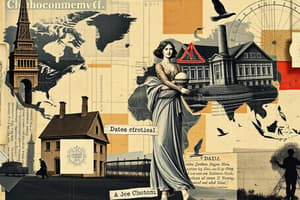Podcast
Questions and Answers
What is the highest mountain in the world?
What is the highest mountain in the world?
- Mount Everest (correct)
- K2
- Kangchenjunga
- Mount Kilimanjaro
Which ocean is the largest in the world?
Which ocean is the largest in the world?
- Atlantic Ocean
- Arctic Ocean
- Indian Ocean
- Pacific Ocean (correct)
In which year was the United Nations founded?
In which year was the United Nations founded?
- 1945 (correct)
- 1939
- 1960
- 1950
Which of the following authors is known for the novel 'War and Peace'?
Which of the following authors is known for the novel 'War and Peace'?
What are the four fundamental states of matter?
What are the four fundamental states of matter?
Which country is a permanent member of the UN Security Council?
Which country is a permanent member of the UN Security Council?
Which famous artist is associated with Renaissance art?
Which famous artist is associated with Renaissance art?
Which animal is known as the fastest land animal capable of speeds up to 75 mph?
Which animal is known as the fastest land animal capable of speeds up to 75 mph?
Flashcards are hidden until you start studying
Study Notes
General Knowledge
Geography
- Continents: 7 continents – Africa, Antarctica, Asia, Australia, Europe, North America, South America.
- Largest Ocean: Pacific Ocean.
- Highest Mountain: Mount Everest (8,848 meters).
History
- World Wars:
- WWI: 1914-1918
- WWII: 1939-1945
- Founding of the United Nations: 1945, after WWII.
Science
- Elements: 118 known elements in the periodic table.
- States of Matter: Solid, liquid, gas, and plasma.
Literature
- Famous Authors:
- William Shakespeare: English playwright and poet.
- Leo Tolstoy: Russian novelist, known for "War and Peace".
General Trivia
- Nobel Prizes: Established by Alfred Nobel, awarded annually in various categories.
- Olympics: First modern Olympics held in Athens, Greece in 1896.
Politics
- Major Political Systems: Democracy, authoritarianism, monarchy, communism.
- UN Security Council Members: 15 total, 5 permanent (USA, UK, France, Russia, China).
Art and Culture
- Renaissance Art: Major figures include Leonardo da Vinci and Michelangelo.
- Music Genres: Classical, jazz, rock, pop, hip-hop.
Technology
- Internet: Developed in the late 20th century; key protocols include TCP/IP.
- Smartphones: Revolutionized communication and technology in the 21st century.
Biology
- Human Body Systems: Circulatory, respiratory, nervous, digestive, immune.
- Biodiversity: The variety of life on Earth, critical for ecosystem health.
Economy
- Basic Economic Concepts: Supply and demand, inflation, GDP.
- Types of Economies: Market economy, planned economy, mixed economy.
Current Events (As of 2023)
- Climate Change: Focus on renewable energy and sustainability.
- Geopolitical Tensions: Notable issues include US-China relations and conflicts in Eastern Europe.
Sports
- FIFA World Cup: Premier international soccer tournament, held every four years.
- Olympic Sports: Over 30 sports included in the Summer and Winter games.
Famous Inventions
- Telephone: Invented by Alexander Graham Bell.
- Light Bulb: Perfected by Thomas Edison.
Random Facts
- Longest River: Nile River (approximately 6,650 km).
- Fastest Land Animal: Cheetah, capable of speeds up to 75 mph.
Geography
- The Earth has 7 continents: Africa, Antarctica, Asia, Australia, Europe, North America, and South America.
- The largest ocean on Earth is the Pacific Ocean.
- Mount Everest, with a height of 8,848 meters, is the tallest mountain on Earth.
History
- World War I took place from 1914 to 1918.
- World War II occurred from 1939 to 1945.
- The United Nations was founded in 1945, following the end of World War II.
Science
- There are 118 known elements in the periodic table.
- Matter exists in four states: solid, liquid, gas, and plasma.
Literature
- William Shakespeare, an English playwright and poet is renowned for his works like Hamlet, Romeo and Juliet, and Macbeth.
- Leo Tolstoy, a Russian novelist, wrote famous works including "War and Peace" and "Anna Karenina."
General Trivia
- Alfred Nobel established the Nobel Prizes, awarded annually in various fields for outstanding achievements.
- Athens, Greece hosted the first modern Olympic Games in 1896.
Politics
- Major political systems include democracy, authoritarianism, monarchy, and communism.
- The UN Security Council has 15 members: 5 permanent members (USA, UK, France, Russia, China) and 10 non-permanent members.
Art and Culture
- The Renaissance artistic movement featured prominent figures like Leonardo da Vinci and Michelangelo.
- Music genres include classical, jazz, rock, pop, and hip-hop.
Technology
- The internet was developed in the late 20th century, built around key protocols like TCP/IP.
- Smartphones have revolutionized communication and technology in the 21st century.
Biology
- The human body comprises several systems, including the circulatory, respiratory, nervous, digestive, and immune systems.
- Biodiversity refers to the variety of life on Earth, crucial for the health of ecosystems.
Economy
- Basic economic concepts include supply and demand, inflation, and GDP.
- Economies can be categorized as market economies, planned economies, or mixed economies.
Current Events (As of 2023)
- Climate change remains a pressing priority, with a focus on renewable energy and sustainability.
- Geopolitical tensions are evident in issues such as US-China relations and conflicts in Eastern Europe.
Sports
- The FIFA World Cup is the world's most prestigious international soccer tournament held every four years.
- Over 30 sports are included in the Summer and Winter Olympic Games.
Famous Inventions
- Alexander Graham Bell is credited with inventing the telephone.
- Thomas Edison perfected the light bulb.
Random Facts
- The Nile River, spanning approximately 6,650 kilometers is the longest river on Earth.
- The cheetah holds the title of the fastest land animal, reaching speeds of up to 75 mph.
Studying That Suits You
Use AI to generate personalized quizzes and flashcards to suit your learning preferences.




